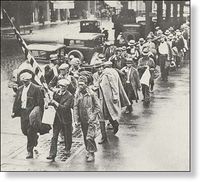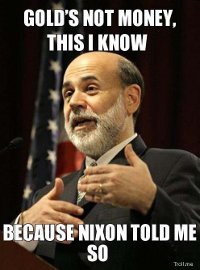Think of this as Volume 16, Number 20 of A-Clue.com, the online newsletter I've written since 1997. Enjoy.
 The eternal struggle in any capitalist system is between creditors and debtors.
The eternal struggle in any capitalist system is between creditors and debtors.
For creditors it seems sisyphean. You make loans, you make money, but then debtors can take you out for a pittance through bankruptcy. That's the risk. You loan too aggressively and, just when you think you're about to take the pot, it's snatched away from you. Game over, start again.
What we need to understand is that countries and, in fact, the whole world, plays this game, and that not only does it not end but that it never should. Which means there has to be a way to re-start the game when the debtor cries uncle.
There has to be a method for national bankruptcy that re-starts growth.
 Two crises ago, all this got tested by what Americans call the Great Depression. The stock market crash caused massive bankruptcy and Republicans like Andrew Mellon said take it all down. Liquidate. Sell everyone out, give the banks the proceeds, and they will re-start the game when it's in their interest to do so.
Two crises ago, all this got tested by what Americans call the Great Depression. The stock market crash caused massive bankruptcy and Republicans like Andrew Mellon said take it all down. Liquidate. Sell everyone out, give the banks the proceeds, and they will re-start the game when it's in their interest to do so.
Doesn't work. Didn't then, doesn't now. That's because bankers are rightly, rightfully timid. When they get burned by bankruptcy – and bankers are always burned by bankruptcy – the last thing they want to do is head down the road again. They don't want the country playing the debtors' game, either, and resist it with every fiber of their political being.
But it's the only way things can work. When there's no one buying someone has to step up. That's government's role. FDR did it, even Hitler did it, and while guns have a natural attraction over butter it worked in both cases. The U.S. achieved double-digit growth rates in FDR's first term, by creating new money, by loaning it out, by tolerating inflation.

What was wrong with the Fed's strategy was that it gave the money to the wrong people. By giving the money to the bankers it encouraged them to keep bad loans on the books and continue to squeeze the debtors. But the whole idea of bankruptcy is debtor relief. It's designed to create a new deal, if not a New Deal, a new hand to play.
What was true for America a few years ago is true for Europe now. The problem there is that, since we're talking about countries rather than companies, we have creditor countries and debtor countries. Creditor countries like Germany want to be paid. Debtor countries like Greece can't pay. It's a standstill, unless a bankruptcy process can be worked out the debtor can live with, and until bad loans are written off, the lenders recapitalized.
The “growth crisis” of our time has happened because business has become political. Creditors control governments on both sides of the Atlantic, and they want their money. But debtors – the people of the United States and the states of Europe – don't have the money. Bad loans have to be written off, bad banks have to be taken out, and the whole system needs to be recapitalized.

They're bullshit because they don't account for change. They don't account for the natural deflation of mass production (let alone Moore's Law), and they don't account for this essential, eternal struggle, a game where both sides must be made safe to play again before growth can happen. After his theories were shown to be false in the 1930s Von Mises moved to the U.S., where under the claimed banner of “liberty” they metastasized into the intellectual heart of the modern conservative movement.
That heart is faulty. That heart is broken. That heart is heartless. Any heart that makes Sheldon Adelson a hero is worthless.
At the heart of the present crisis is saying adieu to this false heart, and acknowledging the reality of the modern world. Their side has the money, and they want the rest of it. But if they get the rest of it, what then? They're eating their own seed corn, destroying the markets they depend on, and despite their ownership of the media, despite their uncontrolled political spending, they have to be stopped.
That's the struggle of the current election year. That's the crisis. Using the tools of democracy to save capitalism from itself and allowing the game to be restarted, freeing the debtors of their debts, and growing once again.










